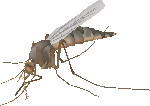Japanese Encephalitis: Symptoms, Cause,
Prevention and Treatment

Japanese encephalitis is an infection of the brain caused by a virus. The virus is transmitted to humans by mosquitoes.
The virus that causes Japanese encephalitis is called an arbovirus, which is an arthropod-borne virus. Mosquitoes in a number of regions carry this virus and are responsible for passing it along to humans. Many of these areas are in Asia, including Japan, Korea, China, India, Thailand, Indonesia, Malaysia, Vietnam, Taiwan, and the Philippines.
Causes and Symptoms
The virus is transferred to a human when an infected mosquito sucks that person's blood. Once in the body, the virus travels to various glands where it multiplies. The virus can then enter the bloodstream. Ultimately, the virus settles in the brain, where it causes serious problems.
Japanese encephalitis begins with fever, severe headache, nausea, and vomiting. As the tissue covering the brain and spinal cord (the meninges) becomes infected and swollen, the patient will develop a stiff and painful neck. By day two or three, the patient begins to suffer the effects of swelling in the brain. These effects include:
- Problems with balance and coordination
- Paralysis of some muscle groups
- Tremors
- Seizures
- Lapses in consciousness
- A stiff, mask-like appearance of the face.
The patient becomes dehydrated and loses weight. If the patient survives the illness, the fever will decrease by about day seven and the symptoms will begin to improve by about day 14. Other patients will continue to have extremely high fevers and their symptoms will get worse. In these cases, coma and then death occur in 7-14 days. Many patients who recover have permanent disabilities due to brain damage.
Prevention
A three-dose vaccine is available for Japanese encephalitis and is commonly given to young children in areas where the disease is endemic. Travelers to these regions can also receive the vaccine.
Controlling the mosquito population with insecticides is another preventive measure. Visitors to regions with high rates of Japanese encephalitis should take precautions (like using mosquito repellents and sleeping under a bed net) to avoid contact with mosquitoes.
Treatment
There are no treatments available to stop or slow the progression of Japanese encephalitis. Only the symptoms of each patient can be treated. Fluids are given to decrease dehydration and medications are given to decrease fever and pain. Medications are available to attempt to decrease brain swelling. Patients in a coma may require mechanical assistance with breathing.
While the majority of people infected with arbovirus never become sick, those who develop Japanese encephalitis become very ill. Some outbreaks have a 50% death rate. A variety of long-term problems may haunt those who recover from the illness.
Young children are most likely to have serious, long-term problems after an infection.
|